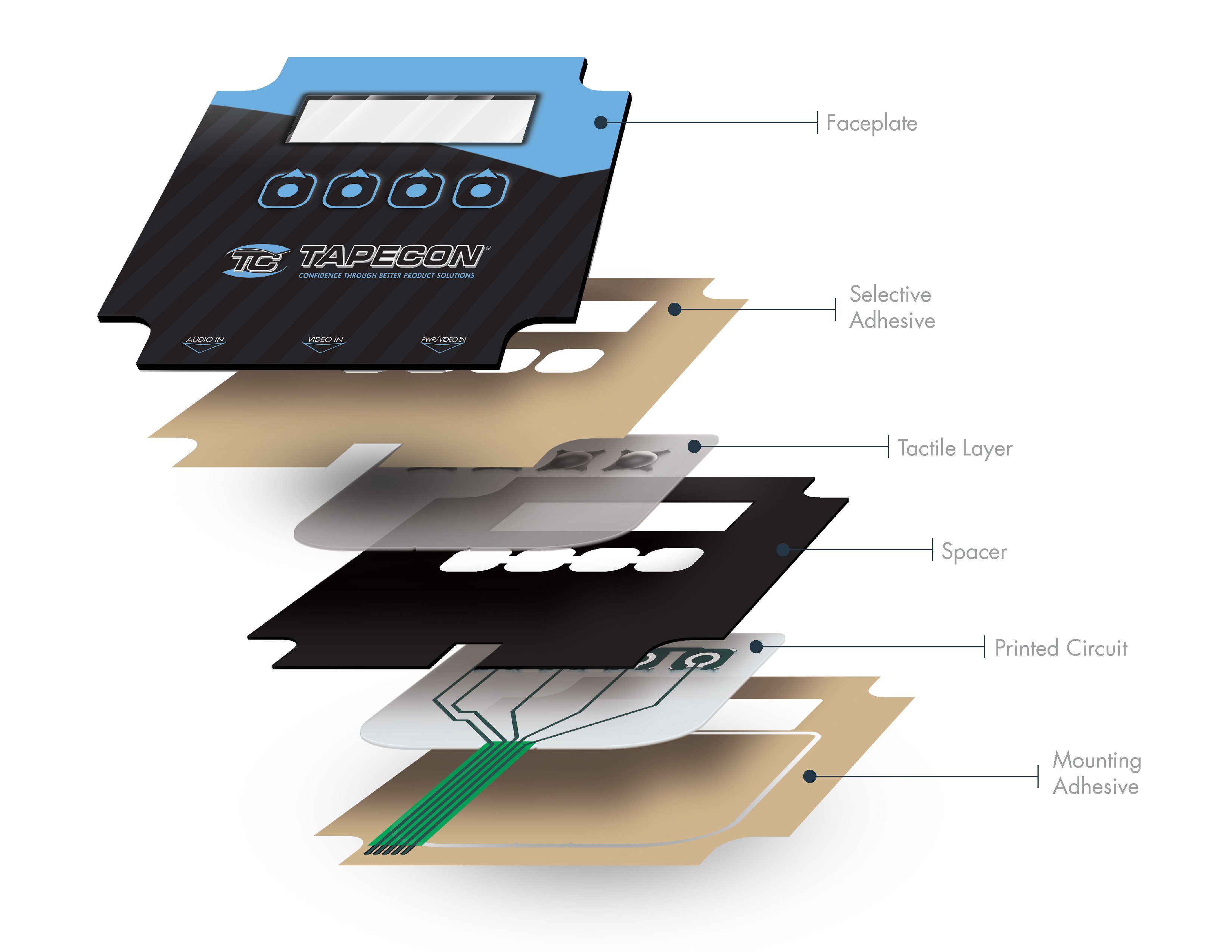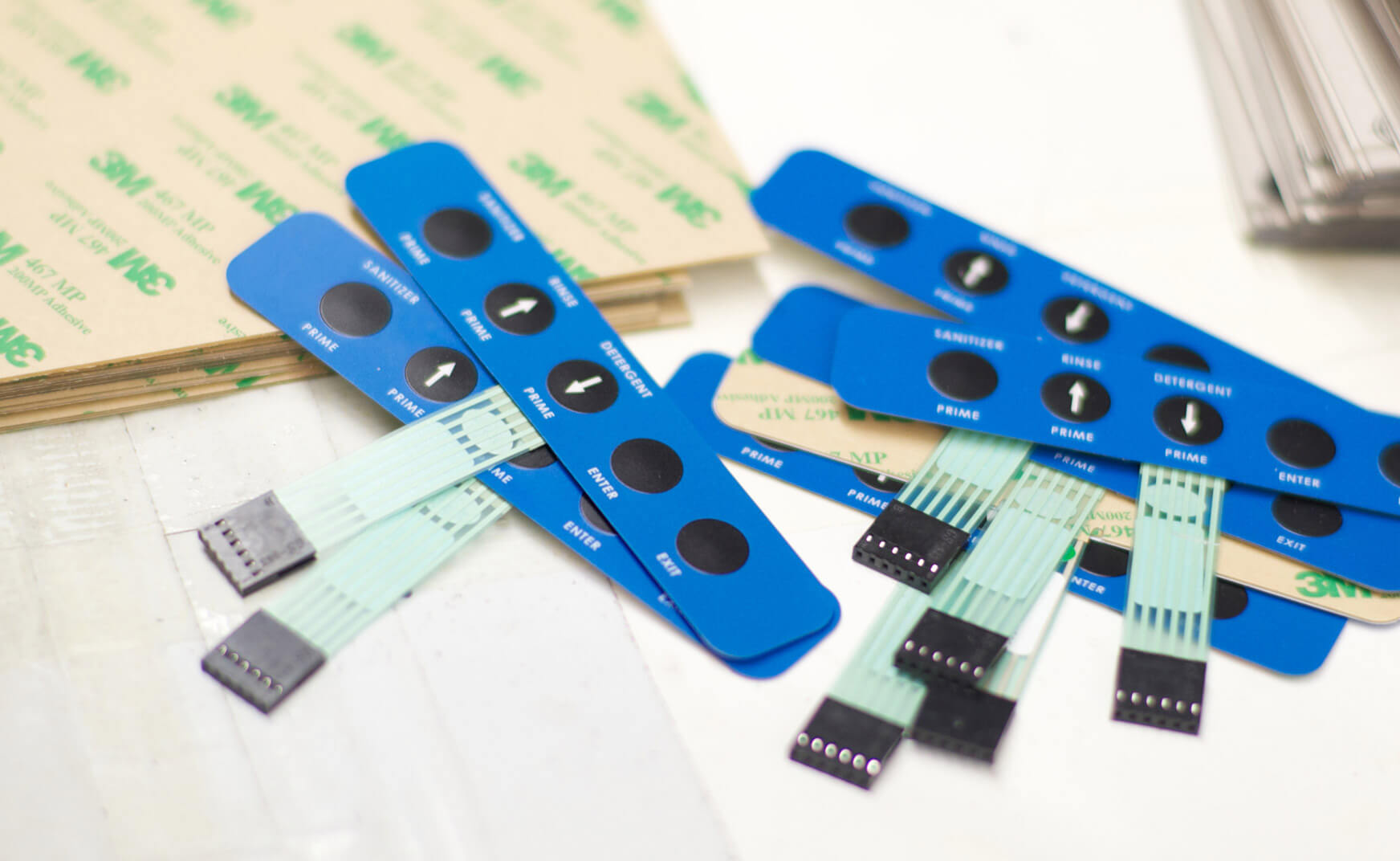Ensuring Quality and Longevity with Membrane Switches in Electronics
Ensuring Quality and Longevity with Membrane Switches in Electronics
Blog Article
Understanding the Value of Membrane Switches in User Interfaces
Membrane buttons are integral parts in the design of reliable interface, helping with not just performance however additionally boosting aesthetic appeal and user interaction. Their one-of-a-kind features, such as resistance to customizable layouts and environmental aspects, make them ideal for a diverse selection of applications across several markets. As we discover the different advantages and future trends related to Membrane innovation, it becomes clear that these switches are greater than simply elements; they stand for a convergence of advancement and functionality. The effects of this modern technology on individual experience are worth examining better.
What Are Membrane Switches?

The spacer layer, which includes glue homes, enables the separation of the circuit layer from the overlay, guaranteeing that the button stays in a non-activated state until pressed. When pressure is used to the overlay, it compresses the spacer layer, linking the space and finishing the circuit in the underlying layer. This layout not only decreases the physical room required for standard mechanical buttons but additionally improves the resilience of the gadget, as Membrane buttons are generally resistant to dirt, wetness, and various other ecological factors.
Frequently found in applications varying from consumer electronics to clinical devices, Membrane switches are important to modern innovation, offering a efficient and easy to use user interface that lines up with contemporary design needs.
Advantages of Membrane Buttons
While numerous button innovations exist, Membrane Switches deal distinctive advantages that make them especially preferable in various applications. One of the key benefits of Membrane buttons is their portable layout, which enables space-saving implementations in devices where property is limited. Their thin profile not only enhances visual charm but additionally promotes lightweight building.
Another substantial advantage is their resistance to environmental aspects. Membrane buttons are usually secured versus wetness, dust, and contaminants, making them optimal for usage sought after atmospheres, such as clinical gadgets and industrial equipment. This sturdiness prolongs the lifespan of the switch, decreasing upkeep expenses and enhancing reliability.
Moreover, Membrane switches can be customized to satisfy details design needs, including unique graphics and shades that improve customer communication. Their tactile feedback options can additionally be customized to give an enjoyable user experience. Furthermore, Membrane buttons are cost-efficient, particularly in high-volume applications, as they can be generated effectively.
Applications in Various Industries

In the consumer electronic devices field, Membrane switches prevail in tools such as microwaves, washing devices, and push-button controls. Their responsive feedback and aesthetic options improve customer experience while supplying a smooth, modern-day look. Additionally, vehicle manufacturers utilize Membrane buttons in control panel controls and infomercial systems, where room is limited, and individual involvement is crucial.
Moreover, the commercial industry leverages Membrane buttons in control panels for machinery and equipment, enabling instinctive operation in frequently severe atmospheres. Their resistance to chemicals and wetness guarantees long life and dependability in these applications. Overall, the versatility of Membrane Switches adds considerably to their widespread usage, making them indispensable in various technical domain names.
Style Factors To Consider for Membrane Switches

When making Membrane buttons, a number of vital considerations have to be considered to guarantee optimum performance and individual experience. Firstly, the option of products is important; picking durable, premium substratums can improve the switch's long life and resistance to environmental aspects such as moisture and temperature fluctuations.
Secondly, the style of the visuals overlay need to prioritize quality and ease of usage. Icons and text need to be clear, and the format must assist in instinctive communication (membrane switches). In addition, tactile comments is important; including a responsive dome or various other systems can boost the customer experience by offering physical verification of activation
One more important element is the switch's electric efficiency. Developers must make sure that the conductive traces are correctly designed to decrease resistance and avoid signal disturbance. This involves analyzing the needed actuation pressure and making certain compatibility with the electronic elements they will certainly interface with.

Future Fads in Membrane Technology
As innovation remains to development, Membrane buttons are poised to advance significantly, driven by developments in products and making strategies. One emerging trend is the unification of advanced products, such as conductive inks and versatile substratums, which enhance longevity and reduce the total weight of Membrane switches. These products not just improve the tactile click reference feedback yet additionally allow for the style of switches that can withstand harsher ecological problems.
Additionally, the assimilation of touch-sensitive technologies is changing standard Membrane Switches into more interactive interface. Capacitive touch sensing units installed within Membrane switch panels can give a more receptive and intuitive customer experience, straightening with the growing demand for smooth, modern-day layouts in consumer electronics.
In addition, innovations in printing strategies, such as electronic and 3D printing, allow rapid prototyping and customization of Membrane buttons. This adaptability allows suppliers to react faster to market demands and consumer preferences.
Finally, sustainability is becoming a substantial emphasis, with producers discovering environment-friendly products and procedures. As these trends unfold, the future of Membrane modern technology assures enhanced capability, aesthetic charm, and ecological obligation, solidifying their duty in innovative user interfaces throughout numerous markets.
Verdict
In verdict, Membrane Switches represent a crucial element in the style of individual interfaces, combining capability with visual adaptability. As improvements in innovation continue, the advancement of Membrane buttons is anticipated to more improve customer interfaces, driving advancement and improving use in an increasingly complicated technical landscape.
Membrane switches are integral components in the design of effective user interfaces, promoting not only capability however additionally improving visual allure and customer interaction.Membrane Switches serve as a crucial element in numerous customer interfaces, assisting in a smooth communication between customers and electronic tools.While various switch technologies exist, Membrane Switches deal unique More Bonuses advantages that make them specifically desirable in different applications.Additionally, Membrane switches can be tailored to fulfill specific design demands, incorporating distinct graphics and colors that boost individual interaction.In final thought, Membrane Switches stand for a vital element in the layout of user interfaces, integrating capability with visual flexibility.
Report this page